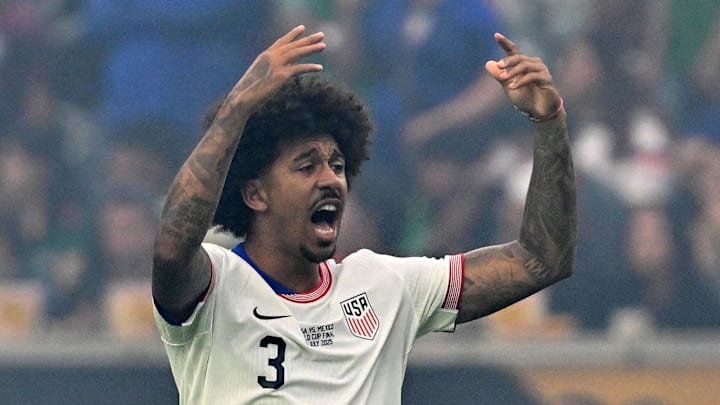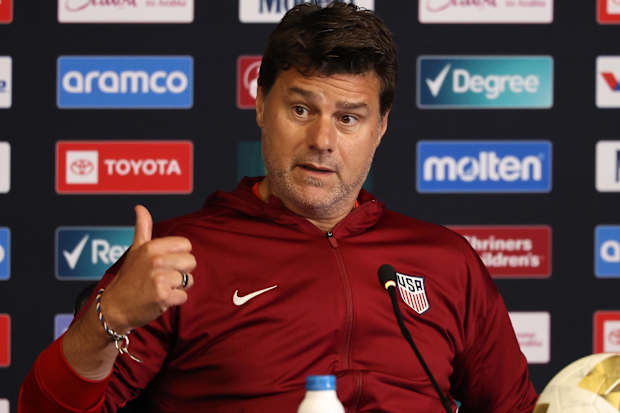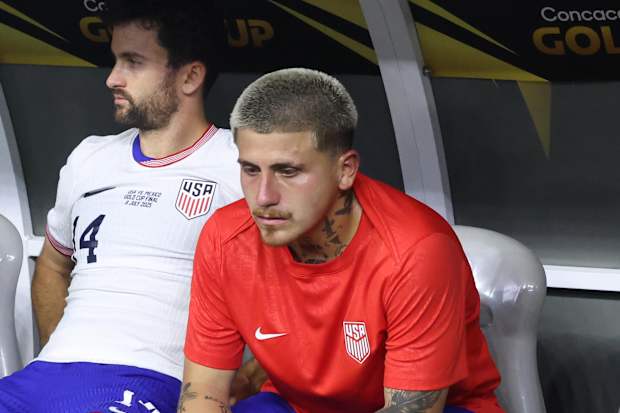USMNT Stars Explode Over 'Shaq-Style' Handball That Cost Them Gold Cup Glory

Following their exit from the pitch and return to the dressing room after the Concacaf Gold Cup championship match, the U.S. men's national soccer team remained haunted by the circumstances that caused their downfall.
The experiences from this summer campaign and the critical moments from the title game will replay endlessly in the minds of both players and head coach Mauricio Pochettino for months to come, creating an ongoing loop of disappointment and wondering about missed opportunities.
Although they secured an early advantage against Mexico, the USMNT suffered a 2-1 defeat before more than 72,000 spectators in Houston this past Sunday, losing their last official match before the upcoming FIFA World Cup and squandering a prime chance to alter perceptions surrounding the squad.
Post-game disappointment centered heavily on the uncalled handball incident involving Mexico's Jorge Sanchez in the penalty box during the 67th minute. Though the rule's interpretation permitted Sanchez's action of falling onto the ball, this explanation failed to satisfy Pochettino and his players.
"The issue with Concacaf is that I believe we're consistently trailing when it comes to officiating standards," goal scorer and central defender Chris Richards shared with Yahoo Sports following the contest. "That guy handled the ball like Shaq would in the penalty area."
An animated Pochettino stated: "I won't shed tears over this. I wanted to speak honestly, and honestly, if that same incident occurred in the other penalty box, it would definitely be awarded as a penalty."
Richards also questioned the assistant referee's decision on a 77th-minute set piece that resulted in Edson Alvarez's match-winning goal, noting that a Mexican player seemed to be in an offside position. "In any other competition, that would have been flagged for offside," he expressed with frustration. "But once again, that's typical Concacaf behavior. They're biased against us."
Although the USMNT displayed clear determination throughout the competition and final match—something unprecedented for the team in recent years—it proved insufficient to overcome Mexico. The passion and tenacity were present, but the technical ability and tactical adaptability fell short of El Tri's level, leaving them searching for explanations.
"My squad doesn't deserve this treatment," Pochettino continued. "If we're defeated, we accept it. No issues there. I'm the first to acknowledge we must get better. I'm not complaining. I'm not criticizing Mexico. I have complete respect for Mexico, and I congratulated them immediately.
"I'm simply questioning whether, if the situation were reversed, would their coach or players respond similarly? In my opinion, there would be chaos in the stadium. But for us, it's treated as, 'okay, they're good sports.' You understand? 'They're good sports. No big deal.'"
Gold Cup Achievement Might Be Deceptive

Even with the narrow defeat, the experiences and insights from the USMNT's 40-plus days together reveal a far more concerning reality. While they secured five victories in five matches, this achievement might be merely an illusion.
The squad entered the competition following disappointing exhibition defeats to Switzerland and Turkey, carrying those same problems into the Gold Cup. They defeated 100th-ranked Trinidad and Tobago, 83rd-ranked Haiti, 58th-ranked Saudi Arabia, and 106th-ranked Guatemala, but required a penalty shootout to eliminate 54th-ranked Costa Rica before losing to 17th-ranked Mexico.
There were positive highlights, including Sebastian Berhalter's development, Matt Freese's goalkeeping performances, and Diego Luna's impressive displays against Guatemala in the semifinal, though none of these players excelled in the championship game.
Rather than confronting these problems, Pochettino skillfully redirected attention toward the officiating instead of the tactical and roster issues that contributed to their fifth consecutive defeat against a top-30 ranked opponent.
Difficulties in Reintegrating Star Players

Moving forward, Pochettino confronts an even greater obstacle: preserving the renewed enthusiasm within the squad while incorporating elite talents such as Christian Pulisic, Weston McKennie, and Tim Weah, among others, who were unavailable for this tournament but may participate in upcoming September friendlies against South Korea and Japan.
"Every American footballer has the chance to earn a roster spot. It's our responsibility now to evaluate," Pochettino explained. "All candidates are being examined, and we're certainly monitoring them. Every player has the potential to be chosen one year before the World Cup, but we must construct a roster for September, and we'll evaluate the conditions, circumstances, performances, and fitness levels. Don't be concerned."
The Gold Cup concluded differently than the USMNT anticipated, and the achievements likely carry less significance than initially appeared. However, the program now moves into its next stage, working to consolidate everything for September and beyond, with all attention focused on June 12, 2026, when they begin World Cup play in Los Angeles.
"This represents a crucial learning experience for us, I believe it's invaluable," Pochettino reflected. "I think it was an incredible tournament to understand how we wanted to develop... [but it's also] an evening that brings tremendous pain, because losing a championship, or losing any match, hurts.
"But the key thing is to keep our heads held high."
